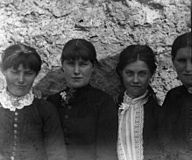Bodyke
Bodyke
Lúbán Díge | |
|---|---|
Catholic parish | |
| Coordinates: 52°53′02″N 8°35′59″W / 52.883816°N 8.599809°W | |
| Country | Ireland |
| Province | Munster |
| County | County Clare |
| Time zone | UTC+0 (WET) |
| • Summer (DST) | UTC-1 (IST (WEST)) |
Bodyke (/ˈboʊdaɪk/; Template:Lang-ga) is a village and Catholic parish in County Clare, Ireland. It is located in eastern Clare. In the 1880s the Bodyke evictions were widely publicised.
Village
The village of Bodyke lies in the foothills of the Slieve Aughty mountains. Its name may come from "Both-Teig" (Teig's hut).[1]
Parish
The Roman Catholic parish of Bodyke is part of the Roman Catholic Diocese of Killaloe.[2] The modern parish incorporates the medieval parish of Kilnoe and the southern part of the medieval parish of Tuamgraney, which may have been combined early in the 18th century.[1] Bodyke is noted for its local church, the Church of Our Lady of the Assumption, which was originally built in 1844.[1] The church of St Joseph's serves Tuamgraney.[3]
Schools are Bodyke National School, Scariff Community School and Tuamgraney National School.[4] The Raheen Community Hospital in Tuamgraney is a public nursing home and day center.[5]
Bodyke evictions
In the 1880s Colonel O'Callaghan, the principal landowner at Bodyke, had refused to lower the rents he charged his tenants. They were in distress.[6] In June 1887 O'Callaghan called for police assistance in evicting the tenants, who resisted by force, witnessed by large crowds.[7] Thirty-five of his tenants returned to their homes after being evicted.[8] Twenty six people, all but four of them women, were charged with assaulting and obstructing the forces of the law, with sentences ranging from acquittal to three months hard labor.[7] The prolonged affair was widely reported and caused angry debates in Parliament. As one member said, "The name of Bodyke stank in the nostrils of the Government..."[8] The evictions continued into the 1890s, with goods and livestock seized in lieu of rent. Often the livestock died of poisoning soon after.[9]
-
The O'Halloran girls, c. 1888-90
-
Suppressed meeting, Bodyke, c. 1888-90
-
Widow Macnamara in her fortress, c. 1888-90
Notable people
The novelist Edna O'Brien and family historian Edward MacLysaght came from the parish of Bodyke.[1]
References
- ^ a b c d Bodyke (Lúbán Díge).
- ^ Bodyke (Kilnoe and Tuamgraney), Profile.
- ^ Bodyke (Kilnoe and Tuamgraney), Churches.
- ^ Bodyke (Kilnoe and Tuamgraney), Schools.
- ^ Raheen Community Nursing Unit.
- ^ Home Affairs: A National Party, p. 150.
- ^ a b The Evictions, Clare County Library.
- ^ a b Parliament 1888, p. 1334.
- ^ Disturbances and Distress.
Sources
- "Bodyke (Lúbán Díge)". County Clare Library. Retrieved 11 September 2013.
- "Bodyke (Kilnoe and Tuamgraney), Churches". Diocese of Killaloe. Archived from the original on 4 March 2016. Retrieved 13 April 2014.
- "Bodyke (Kilnoe and Tuamgraney), Profile". Diocese of Killaloe. Retrieved 30 March 2014.
- "Bodyke (Kilnoe and Tuamgraney), Schools". Diocese of Killaloe. Archived from the original on 4 March 2016. Retrieved 13 April 2014.
- "Disturbances and Distress". Clare County Library. Retrieved 13 April 2014.
- "Home Affairs: A National Party". The Fortnightly Review. Chapman and Hall. 1887. Retrieved 13 April 2014.
- Parliament, Great Britain (1888). Hansard's Parliamentary Debates. Hansard. Retrieved 13 April 2014.
{{cite book}}: Invalid|ref=harv(help) - "Raheen Community Nursing Unit". My Home from Home. Retrieved 13 April 2014.
- "The Evictions". Clare County Library. Retrieved 13 April 2014.





